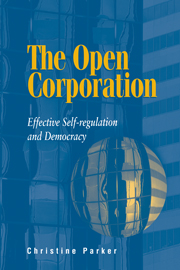Book contents
- Frontmatter
- Contents
- List of tables and figures
- Preface
- Acknowledgements
- 1 Introduction: Corporate self-regulation in the new regulatory State
- 2 The potential for self-regulation
- 3 Motivating top-management commitment to self-regulation
- 4 Cultivating self-regulation leadership
- 5 Self-regulation methodology and social harmony
- 6 The pathologies of self-regulation
- 7 Model corporate Citizens: The role of self-regulation Professionals
- 8 The three strategies of ‘permeability’ in the open Corporation
- 9 Meta-regulation: The regulation of self-regulation
- 10 Conclusion
- Appendix: Methodology
- Notes
- Reference
- Index
6 - The pathologies of self-regulation
Published online by Cambridge University Press: 05 July 2014
- Frontmatter
- Contents
- List of tables and figures
- Preface
- Acknowledgements
- 1 Introduction: Corporate self-regulation in the new regulatory State
- 2 The potential for self-regulation
- 3 Motivating top-management commitment to self-regulation
- 4 Cultivating self-regulation leadership
- 5 Self-regulation methodology and social harmony
- 6 The pathologies of self-regulation
- 7 Model corporate Citizens: The role of self-regulation Professionals
- 8 The three strategies of ‘permeability’ in the open Corporation
- 9 Meta-regulation: The regulation of self-regulation
- 10 Conclusion
- Appendix: Methodology
- Notes
- Reference
- Index
Summary
The self-regulation System may be able to help heal the rift between individual ethics, social values and the culture of business. But there are cracks in the fagade of harmony. The very fact that compliance managers spend so long explaining their harmonizing function and the need to ‘seil compliance’ indicates that the just and seamless melding of legal/social responsibility and organizational management is a highly problematic accomplishment. A preliminary survey of occupational stress among US health care compliance officers concluded that they were ‘more likely than most professional groups to experience stress associated with workload, role conflict, and role ambiguity’. Interviewees reported conflict between ‘the government's and the board's expectations and the way business just gets done’, being expected ‘to ensure compliance with the deals and contracts that some senior management made and signed without input or review by the compliance officer’, and feeling responsible for compliance problems they uncovered but could not solve (Heller and Guetter 1999:47, 48, 50). These contradictions in the compliance function are structural. They relate to potential pathologies of compliance that have their origins in the techniques of the new regulatory State, and in the demands of organizations to make compliance problems disappear.
The first part of this chapter considers three contradictions implied in the encouragement of corporate self-regulation by the new regulatory State. The second part considers four potential pathologies in the corporate implementation of compliance systems.
- Type
- Chapter
- Information
- The Open CorporationEffective Self-regulation and Democracy, pp. 135 - 167Publisher: Cambridge University PressPrint publication year: 2002



